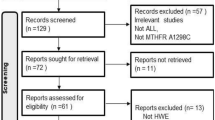Abstract
Acute lymphoblastic leukemia (ALL) is the most common pediatric malignancy. Genetic polymorphisms in the folate metabolic pathway may contribute to the susceptibility to childhood ALL because they affect the DNA synthesis, methylation, and repair. The most common polymorphisms are methylenetetrahydrofolate reductase (MTHFR) C677T and A1298C. The current study aimed at detecting the frequency of these two genetic polymorphisms in de novo ALL patients, and to clarify their impact on the response to induction chemotherapy, as well as treatment toxicity. MTHFR C677T and A1298C polymorphisms were tested in 30 de novo ALL patients by restriction fragment length polymerase chain reaction technique. Thirty normal age- and sex-matched subjects were subjected to the same analysis as a control group. The frequency of MTHFR A1298C gene polymorphism was significantly lower in ALL patients than the controls thus showing a protective effect. The two polymorphisms had no effect on the response to induction chemotherapy. As regards the treatment toxicity, MTHFR C677T polymorphism was associated with marked thrombocytopenia, while A1298C polymorphism was associated with hepatic toxicity. Identifying predictors of methotrexate sensitivity may lead to the development of individualized treatment strategies with improved efficacy and reduced toxicity as well as adjusting the initial methotrexate dose.



Similar content being viewed by others
Explore related subjects
Discover the latest articles and news from researchers in related subjects, suggested using machine learning.References
Aplenc R, Thompson J, Han P et al (2005) Methylene-tetrahydrofolate reductase polymorphisms and therapy response in pediatric acute lymphoblastic leukemia. Cancer Res 65:2482–2487
Chatzidakis K, Goulas A, Athanassiadou-Piperopoulou F et al (2006) Methylenetetrahydro-folate reductase C677T polymorphisms: association with risk for childhood acute lymphoblastic leukaemia and response during the initial phase of chemotherapy in Greek patients. Pediatr Blood Cancer 47(2):146
Chiusolo P, Reddiconto G, Cimino G et al (2004) Methylenetetrahydrofolate reductase genotypes do not play a role in acute lymphoblastic leukemia pathogenesis in the Italian population. Haematologica 89:139
Costea I, Moghrabi A, Laverdiere C et al (2006) Folate cycle gene variants and chemotherapy toxicity in pediatric patients with acute lymphoblastic leukemia. Haematologica 91:1113
Deligezer U, Akisik E, Dalay N (2003) Genotyping of the MTHFR gene polymorphism, C677T in patients with leukemia by melting curve analysis. Mol Diagn 7(3–4):181
Fazili Z, Pfeiffer CM, Zhang M et al (2008) Influence of 5, 10-methylenetetrahydrofolate reductase polymorphism on whole-blood folate concentrations measured by LC-MS/MS, microbiologic assay, and bio-rad radioassay. Clin Chem 54(1):197
Giuseppe T, Innocenti F (2006) MTHFR polymorphisms and ALL risk: a challenge. Leuk Lymphoma 47(7):1203
Jone RD, Hooijberg JH, Betrand D et al (2005) Effect of polymorphisms in folate related genes on in vitro methotrexate sensitivity in pediatric acute lymphoblastic leukemia. Blood 106:717
Kasap M, Sazci A, Ergul E et al (2006) Molecular phylogenetic analysis of methylenetetrahydrofolate reductase family of proteins. Mol Phylogenet Evol 42(3):838
Kim NK, Chang SY, Jang MD et al (2006) Association of the methylenetetrahydrofolate reductase polymorphism in Korean patients with childhood ALL. Anticancer Res 26(4B):2879
Krajinovic M, Lamothe S, Labuda D et al (2004) Role of MTHFR genetic polymorphisms in the susceptibility to childhood acute lymphoblastic leukemia. Blood 103(1):252
Marie J (1999) Drug resistance and its modifications in hematological malignancies. In: Degos L, Lich D, Lowenberg B (eds) Textbook of malignant haematology, 1st edn. Taylor & Francis, Boca Raton, p 299
Mattsom MP, Kruman II, Duan W (2002) Folic acid and homocysteine in age-related diseases. Aging Res Reviewers 1:95
Oliveira E, Alves S, Quental S et al (2005) The MTHFR C677T and A1298C polymorphisms and susceptibility to childhood acute lymphoblastic leukemia in Portugal. J Pediatr Hematol Oncol 27(8):425
Petra BG, Janez J, Vita D (2007) Gene-gene interactions in the folate metabolic pathway influence the risk for acute lymphoblastic leukemia in children. Leuk Lymphoma 48(4):786
Reddy H, Jamil K (2006) Polymorphisms in the MTHFR gene and their possible association with susceptibility to childhood ALL in an Indian population. Leuk Lymphoma 44(7):1203
Schnakenberg E, Mehles A, Cario G et al (2005) Polymorphism of methylenetetarhydrofolate reductase (MTHFR) and susceptibility to pediatric acute lymphoblastic leukemia in a German study population. BMC Med Gen 6:23
Skibola CF, Smith MT, Kane L et al (1999) Polymorphism in the MTHFR gene is associated with susceptibility to acute leukemia in adults. Natl Acad Sci USA 96:12810
Thirumaran RK, Gast A, Flohr T et al (2005) MTHFR genetic polymorphisms and susceptibility to childhood acute lymphoblastic leukemia. Blood 106(7):2590
Timuragaoglu A, Dizlek S, Uysalgil N et al (2006) Methylenetetrahydrofolate reductase C677T gene polymorphism in adult patients with lymphoproliferative disorders and its effect on chemotherapy. Ann Hematol 85:863
Wilson M, Sidhom I (2007) Polymorphisms of the methylenete-trahydrofolate reductase gene and risk of childhood acute lymphoblastic leukemia. In: The Third International Conference of the Egyptian Society of Haematology and Research, 11–12 April 2007
Zanrosso CW et al (2006) The role of methylenetetrahydrofolate reductase in acute lymphoblastic leukemia in a Brazilian mixed population. Leuk Res 30:477
Zintzaras E (2006) Association of methylenetetrahydrofolate reductase (MTHFR) polymorphisms with genetic susceptibility to gastric cancer: a meta-analysis. J Hum Genet 51(7):618
Author information
Authors and Affiliations
Corresponding author
Rights and permissions
About this article
Cite this article
Arnaout, H.H., Khorshied, M.M., Shaheen, I.A. et al. The clinical significance of methylenetetrahydrofolate reductase (MTHFR) polymorphisms in acute lymphoblastic leukemia. Comp Clin Pathol 21, 39–47 (2012). https://doi.org/10.1007/s00580-010-1062-x
Received:
Accepted:
Published:
Issue Date:
DOI: https://doi.org/10.1007/s00580-010-1062-x




